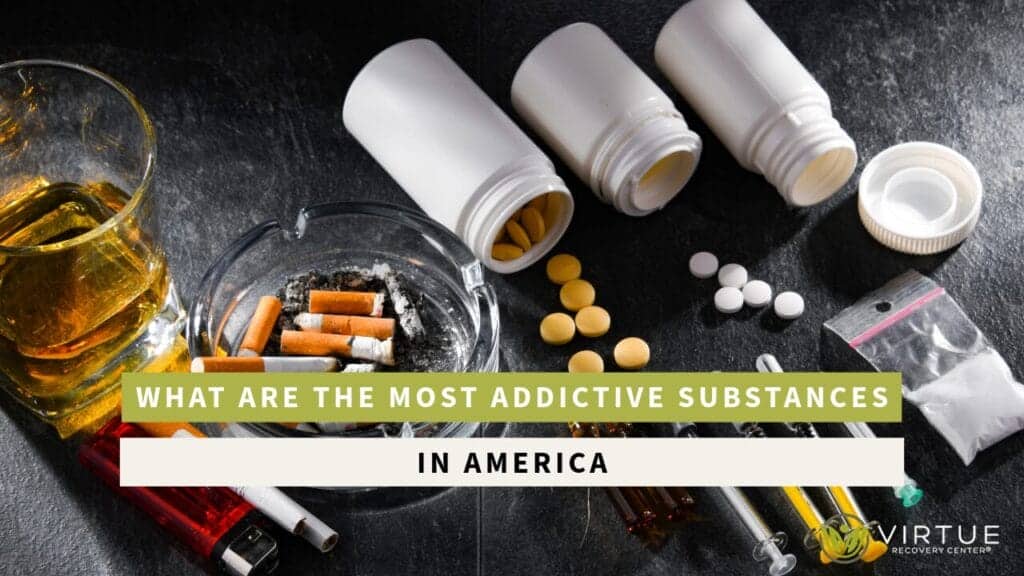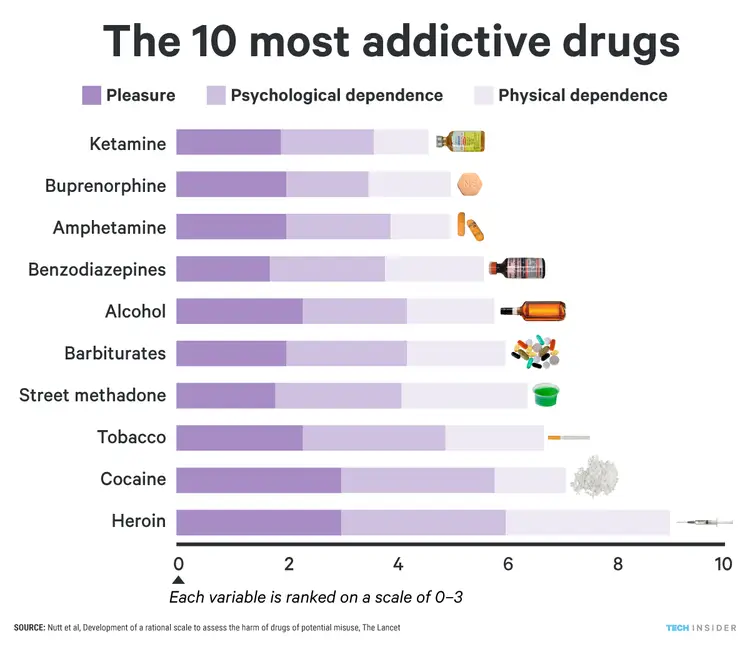
Table of Contents
Key Takeaways:
- Heroin’s High Addiction Level: Heroin is exceptionally difficult to quit due to its intense physical and psychological addictive properties.
- Alcohol Withdrawal Risks: Alcohol is challenging to quit safely due to the potential for dangerous withdrawal symptoms requiring medical oversight.
- Methamphetamine’s Lasting Impact: Recovery from methamphetamine is complicated by the drug’s significant changes to brain structure and function.
- Cocaine’s Psychological Hold: Cocaine addiction is sustained by intense cravings and psychological dependency.
- Nicotine’s Strong Addiction: Nicotine quickly leads to strong dependence and cravings, making quitting challenging.
- Benzodiazepines Withdrawal Severity: These substances can cause life-threatening withdrawal symptoms.
- Prescription Opioids’ Dependence Risk: Painkillers like oxycodone and hydrocodone are highly addictive due to their euphoric effects.
- Barbiturates’ Addiction Potential: Less common today, but highly addictive with severe withdrawal symptoms.
- Addiction Risk of Prescription Stimulants: Medications like Adderall can be addictive when misused or taken in high doses.
The Most Addictive Substances in America
Addiction alters brain function, making it challenging for individuals to make sound decisions. This condition often requires continuous management, akin to other chronic diseases like heart disease or asthma. The substances that commonly lead to addiction in America include:- Alcohol: A legal yet highly addictive substance, often leading to severe health complications and social issues.
- Opioids: Including prescription pain relievers and heroin, opioids have been at the forefront of America’s addiction crisis.
- Cocaine: A powerful stimulant drug causing short-term euphoria, energy, and talkativeness.
- Methamphetamine: Known for its highly addictive nature, methamphetamine can have devastating effects on physical and mental health.
- Marijuana: With the increasing legalization, marijuana use is on the rise, yet its addictive properties and potential risks cannot be ignored.
- Benzodiazepines: Commonly prescribed for anxiety and insomnia, benzodiazepines have a high potential for dependence and abuse, often leading to severe withdrawal symptoms.
- Barbiturates: Once commonly used for anxiety and sleep disorders, barbiturates carry a high risk of addiction and overdose, especially when combined with other substances like alcohol.
- Ketamine: Used medically as an anesthetic, can become addictive when used recreationally due to its euphoric and dissociative properties.

Most Addictive Drugs In America – Virtue Recovery (courtesy of Tech Insider)
Which Addictive Substances Are the Most Difficult to Overcome?
Recovering from addiction varies significantly based on the substance involved, and some are notoriously more challenging to recover from than others. Opioids, including heroin and prescription painkillers, are often considered some of the most difficult substances to quit. This difficulty is due to their powerful effects on the brain’s reward system, leading to intense physical dependence and withdrawal symptoms. Similarly, methamphetamine is known for its high relapse rates, largely because of the profound changes it causes in brain structure and function, affecting areas related to emotion and memory. Alcohol, while legal and socially accepted, can also be particularly challenging to recover from due to its wide availability and withdrawal risks, which can be severe and even life-threatening. Each of these substances requires a comprehensive approach to treatment, often involving both medication-assisted therapy and behavioral interventions. Here’s a list of the most difficult substances to overcome:- Heroin: Known for its severe physical and psychological addiction.
- Alcohol: Withdrawal can be dangerous and requires medical supervision.
- Methamphetamine: Causes significant brain changes, making recovery challenging.
- Cocaine: Highly addictive with intense cravings and psychological dependence.
- Nicotine: Highly addictive; withdrawal can lead to strong cravings.
- Benzodiazepines: Withdrawal can be severe and potentially life-threatening.
- Prescription Opioids: Includes painkillers like oxycodone and hydrocodone, which have high addiction potential.
- Barbiturates: Used less frequently today but highly addictive with severe withdrawal symptoms.
- Amphetamines: Includes prescription drugs like Adderall, which can be addictive.
Comprehensive Treatment Options at Virtue Recovery Center
Virtue Recovery Center offers a range of treatment programs, including Medical Detoxification, which is vital in safely managing withdrawal symptoms and initiating the recovery process. Detoxification is the first step and must be followed by comprehensive treatment to ensure long-term recovery.The Role of Medical Detox in Addiction Treatment
Medical detox is a critical initial step in the treatment of addiction. It involves a three-step process: evaluation, stabilization, and preparation for future treatment. This process is crucial for safely managing withdrawal symptoms and setting the stage for effective long-term treatment.- Evaluation: This stage involves assessing the patient’s medical, psychological, and social situation. It typically includes a physical examination, blood tests, and screenings for co-occurring mental health disorders or other medical conditions. This comprehensive evaluation helps in developing a tailored treatment plan.
- Stabilization: Here, the focus is on assisting patients to achieve sobriety in a medically stable condition. During stabilization, the use of addictive substances is discontinued, and medical professionals may use medications to alleviate withdrawal symptoms, especially for substances like alcohol, tobacco, and opioids. This phase can last from one to three weeks, depending on the severity and type of addiction.
- Preparation for Future Treatment: Post-detox, patients are prepared for additional treatment. Detox primarily addresses the physical aspects of addiction, so this phase is crucial for preparing patients for the psychological challenges ahead. It typically involves educating patients about the importance of therapy, support groups, or other forms of long-term treatment, which are vital for sustaining recovery and preventing relapse.
Is Withdrawal from Addictive Substances Linked to Increased Substance Abuse in America?
Withdrawal from addictive substances can be challenging, often leading individuals to relapse or turn to other drugs for relief. The worst substances for withdrawal, such as alcohol and opioids, can exacerbate this cycle, ultimately contributing to increased substance abuse rates in America as individuals struggle to cope with their symptoms.
FAQ
Q: What makes heroin one of the most difficult substances to quit?
A: Heroin’s intense impact on the brain’s reward system leads to significant physical and psychological dependence.Q: Why is alcohol withdrawal potentially dangerous?
A: Alcohol withdrawal can lead to severe symptoms that may require medical supervision, such as delirium tremens.Q: What challenges do methamphetamine users face in recovery?
A: Methamphetamine causes profound changes in brain function and structure, leading to high relapse rates.Q: How does cocaine addiction sustain itself?
A: Cocaine creates intense cravings and psychological dependence, making it difficult to quit.Q: Why is nicotine so addictive?
A: Nicotine quickly creates dependence, leading to strong cravings upon withdrawal.Q: Are benzodiazepines hard to quit?
A: Yes, benzodiazepines can cause severe and potentially life-threatening withdrawal symptoms.Q: What makes prescription opioids addictive?
A: They have a high potential for addiction due to their euphoric effects and the physical dependency they create.Q: Why are barbiturates less common but still concerning?
A: Though used less frequently, barbiturates have severe withdrawal symptoms and high addiction potential.Q: Can prescription stimulants like Adderall be addictive?
A: Yes, they can be addictive, especially when used without medical supervision or in higher doses than prescribed.Intensive Inpatient Programs for Effective Recovery
Intensive Inpatient Programs (IIPs) play a significant role in addiction treatment, offering a structured environment where patients can receive continuous support and therapy. These programs are particularly effective for individuals with severe addiction and those who require a more immersive treatment experience. IIPs often include a combination of individual therapy, group sessions, and other therapeutic activities designed to foster recovery and prevent relapse. In conclusion, understanding the most addictive substances in America and the available treatment options is crucial in addressing the addiction crisis. Virtue Recovery Center offers an array of effective treatments, including medical detox and Intensive Inpatient Programs, guiding individuals toward a path of recovery and a healthier, drug-free life. National Institute on Drug Abuse (NIDA) – Treatment and Recovery: Overview of addiction treatment and recovery, including the chronic nature of addiction and the importance of treatment. Source: NIDA Banyan Treatment Center – Intensive Inpatient Treatment Program: Information on various treatment programs for substance abuse, including inpatient programs and specialized therapies. Source: Banyan Treatment Center Sutter Health – Addiction Treatment: Details on addiction treatment services, emphasizing the impact of addiction on the brain and the effectiveness of treatment for drug and alcohol use disorders. Source: Sutter Health DrugRehab.com – Medical Detox: An overview of the medical detox process, including its stages and the importance of professional supervision during detoxification. Source: DrugRehab.com Banyan Stuart – Intensive Inpatient Programs for Substance Abuse: Describes the comprehensive services offered in intensive inpatient programs for substance abuse, including a range of therapies and treatment approaches. Source: Banyan StuartAre You Covered For Treatment?
At Virtue Recovery Center, we understand the importance of accessible care. That’s why we’re in-network with numerous private insurance companies, ensuring that your journey to recovery is supported from the start. Let us help you quickly and easily verify your insurance coverage. Begin your path to healing today.
- About the Author
- Latest Posts
Gigi Price( Clinical Director )
Gigi Price holds licenses as a Master Social Worker and Clinical Drug Counselor. She completed her master’s degree in Social Work at Texas State University. Over the last decade, Gigi has been dedicated to utilizing evidence-based practices to enhance patient care and treatment planning, resulting in positive, long-term outcomes for patients and their families. Her passion lies in creating a treatment environment where professionals collaborate to bring about positive change and provide a safe, trustworthy therapeutic experience. Patients can be confident in receiving top-quality care under her leadership.
In her role as the Clinical Director of Virtue Recovery Houston, Gigi conducted research to identify the most effective approaches for treating patients with acute mental health diagnoses, PTSD, and Substance Use Disorder. She then assembled a team of skilled clinicians who could offer various therapeutic modalities, such as Cognitive Behavioral Therapy (CBT), Dialectical Behavioral Therapy (DBT), Acceptance and Commitment Therapy (ACT), Somatic Exposure, Eye Movement Desensitization and Reprocessing (EMDR), and Cognitive Processing Therapy (CPT). Gigi takes pride in overseeing the development and implementation of Virtue Houston’s Treatment Program, which includes two specialized therapeutic curricula tailored to the unique needs of individuals struggling with mental health issues, addiction, and PTSD.
How Cognitive Behavioral Therapy Supports Lasting Sobriety After Cocaine Addiction …
How an Eating Disorder Program Helps Manage Binge-Eating Episodes Key …
Key Takeaways Regular exercise reduces cravings and withdrawal symptoms. Physical …
Key Takeaways Veterans Day began as Armistice Day in 1918 …
Key Takeaways Proper nutrition plays a vital role in addiction …
Key Takeaways Long-term sobriety is achievable with evidence-based addiction treatment …


























